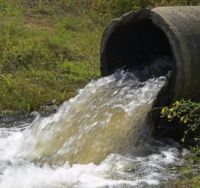

Thames Water has been handed large fines over two sewage incidents that occurred in 2013 and 2015.
In October 2013 an underground sewer pipe in South East London became blocked with tree roots, fat, oil and other debris, a buildup of which caused an overflow of sewage above ground, flooding a field and two nearby streams, ultimately polluting the River Shuttle.
On investigation the Environment Agency found that raw sewage, which could have been flowing into the river for several days, killed around 20 stickleback fish and hundreds of invertebrates, and affected the river habitats and the quality of water over several miles.
Following this incident, Thames Water was ordered to pay £80,000 as a civil sanction to South East Rivers Trust to make improvements to a local river, and pay the Environment Agency's costs of nearly £20,000.
Land and water officer, Jamie Lloyd, commented: "Tree roots were allowed to grow into the sewer unchecked, resulting in fat and sewage solids causing a complete blockage. Sewage backed-up and was sent with some force through the manholes, triggering significant pollution. Thames Water compounded the pollution by failing to clear the sewer quickly after the Environment Agency reported the incident to them."
On a second occasion, Thames Water were fined £2 million and ordered to pay £80,000 in costs after raw sewage polluted two streams in Oxfordshire, killing around 150 fish and flooding a nearby garden. According to judge Peter Ross, it was a high-end, category three harm offence.
Between 8 and 9 August 2015, numerous failures in the management of a sewage pumping station led to sewage emptying into two brooks leading to the River Evenlode. A backlog of raw sewage was forced into the water from a sewer pipe that couldn't hold it. After reports of the incident by members of the public, the Environment Agency discovered that the entire local population of bullhead fish had been killed by the toxic waste along a 50-metre stretch of water.
Investigations discovered Thames Water were aware of the pumping station failure before the incident. Just before the incident, the company ignored more than 800 high-priority alarms needing attention within four hours, another 300 alarms were not properly investigated, all of which pointed out failures with the pumping station.
Lead investigator, Robert Davis said: "This incident was foreseeable and avoidable. Thames Water didn't recognise the increased risk to the environment, ignoring and failing to respond adequately to more than 1000 alarms. We hope this prosecution sends a loud and clear message that the Environment Agency will not accept poor operation, management and maintenance of sewage pumping stations. Where we have evidence of offending and serious pollution incidents like here, we will take appropriate action to bring polluters to justice."
Judge Ross commented that Thames Water was "reckless" by taking an unacceptable level of risk with the environment. It allowed the sewage pumping station to operate with no automatically available standby pump for around 10 months in the year prior to the pollution.